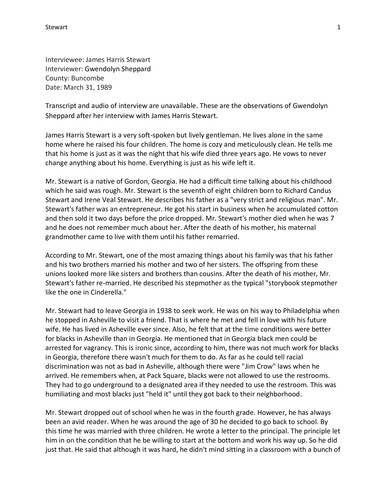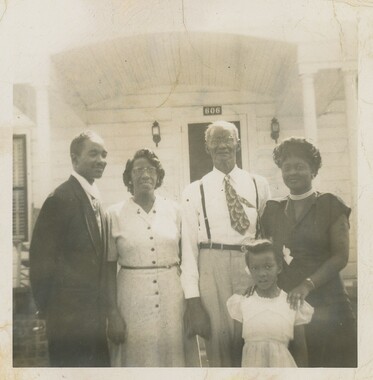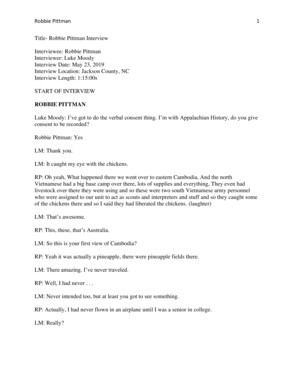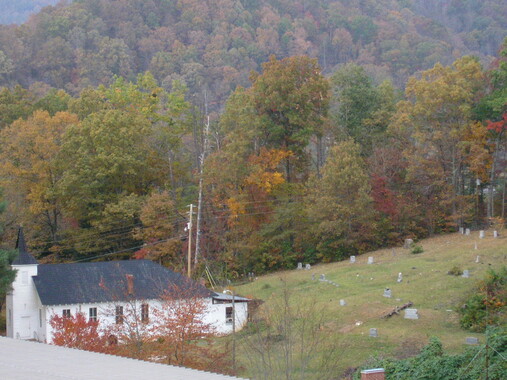Western Carolina University (1)
View all
- Oral Histories of Western North Carolina (18)
- Canton Champion Fibre Company (0)
- Cherokee Traditions (0)
- Civil War in Southern Appalachia (0)
- Craft Revival (0)
- Great Smoky Mountains - A Park for America (0)
- Highlights from Western Carolina University (0)
- Horace Kephart (0)
- Journeys Through Jackson (0)
- LGBTQIA+ Archive of Jackson County (0)
- Picturing Appalachia (0)
- Stories of Mountain Folk (0)
- Travel Western North Carolina (0)
- Western Carolina University Fine Art Museum Vitreograph Collection (0)
- Western Carolina University Herbarium (0)
- Western Carolina University: Making Memories (0)
- Western Carolina University Publications (0)
- Western Carolina University Restricted Electronic Theses and Dissertations (0)
- Western North Carolina Regional Maps (0)
- World War II in Southern Appalachia (0)
University of North Carolina Asheville (0)
View all
- Faces of Asheville (0)
- Forestry in Western North Carolina (0)
- Grove Park Inn Photograph Collection (0)
- Isaiah Rice Photograph Collection (0)
- Morse Family Chimney Rock Park Collection (0)
- Picturing Asheville and Western North Carolina (0)
- Asheville (N.C.) (7)
- Buncombe County (N.C.) (17)
- Cherokee County (N.C.) (1)
- Jackson County (N.C.) (1)
- Mitchell County (N.C.) (1)
- Appalachian Region, Southern (0)
- Avery County (N.C.) (0)
- Blount County (Tenn.) (0)
- Clay County (N.C.) (0)
- Graham County (N.C.) (0)
- Great Smoky Mountains National Park (N.C. and Tenn.) (0)
- Haywood County (N.C.) (0)
- Henderson County (N.C.) (0)
- Knox County (Tenn.) (0)
- Knoxville (Tenn.) (0)
- Lake Santeetlah (N.C.) (0)
- Macon County (N.C.) (0)
- Madison County (N.C.) (0)
- McDowell County (N.C.) (0)
- Polk County (N.C.) (0)
- Qualla Boundary (0)
- Rutherford County (N.C.) (0)
- Swain County (N.C.) (0)
- Transylvania County (N.C.) (0)
- Watauga County (N.C.) (0)
- Waynesville (N.C.) (0)
- Yancey County (N.C.) (0)
- Interviews (18)
- Manuscripts (documents) (1)
- Personal Narratives (1)
- Sound Recordings (17)
- Transcripts (15)
- Aerial Photographs (0)
- Aerial Views (0)
- Albums (books) (0)
- Articles (0)
- Artifacts (object Genre) (0)
- Bibliographies (0)
- Biography (general Genre) (0)
- Cards (information Artifacts) (0)
- Clippings (information Artifacts) (0)
- Crafts (art Genres) (0)
- Depictions (visual Works) (0)
- Design Drawings (0)
- Drawings (visual Works) (0)
- Envelopes (0)
- Facsimiles (reproductions) (0)
- Fiction (general Genre) (0)
- Financial Records (0)
- Fliers (printed Matter) (0)
- Glass Plate Negatives (0)
- Guidebooks (0)
- Internegatives (0)
- Land Surveys (0)
- Letters (correspondence) (0)
- Maps (documents) (0)
- Memorandums (0)
- Minutes (administrative Records) (0)
- Negatives (photographs) (0)
- Newsletters (0)
- Newspapers (0)
- Occupation Currency (0)
- Paintings (visual Works) (0)
- Pen And Ink Drawings (0)
- Periodicals (0)
- Photographs (0)
- Plans (maps) (0)
- Poetry (0)
- Portraits (0)
- Postcards (0)
- Programs (documents) (0)
- Publications (documents) (0)
- Questionnaires (0)
- Scrapbooks (0)
- Sheet Music (0)
- Slides (photographs) (0)
- Songs (musical Compositions) (0)
- Specimens (0)
- Speeches (documents) (0)
- Text Messages (0)
- Tintypes (photographs) (0)
- Video Recordings (physical Artifacts) (0)
- Vitreographs (0)
- Western North Carolina Tomorrow Black Oral History Project (13)
- A.L. Ensley Collection (0)
- Appalachian Industrial School Records (0)
- Appalachian National Park Association Records (0)
- Axley-Meroney Collection (0)
- Bayard Wootten Photograph Collection (0)
- Bethel Rural Community Organization Collection (0)
- Blumer Collection (0)
- C.W. Slagle Collection (0)
- Canton Area Historical Museum (0)
- Carlos C. Campbell Collection (0)
- Cataloochee History Project (0)
- Cherokee Studies Collection (0)
- Daisy Dame Photograph Album (0)
- Daniel Boone VI Collection (0)
- Doris Ulmann Photograph Collection (0)
- Elizabeth H. Lasley Collection (0)
- Elizabeth Woolworth Szold Fleharty Collection (0)
- Frank Fry Collection (0)
- George Masa Collection (0)
- Gideon Laney Collection (0)
- Hazel Scarborough Collection (0)
- Hiram C. Wilburn Papers (0)
- Historic Photographs Collection (0)
- Horace Kephart Collection (0)
- Humbard Collection (0)
- Hunter and Weaver Families Collection (0)
- I. D. Blumenthal Collection (0)
- Isadora Williams Collection (0)
- Jesse Bryson Stalcup Collection (0)
- Jim Thompson Collection (0)
- John B. Battle Collection (0)
- John C. Campbell Folk School Records (0)
- John Parris Collection (0)
- Judaculla Rock project (0)
- Kelly Bennett Collection (0)
- Love Family Papers (0)
- Major Wiley Parris Civil War Letters (0)
- Map Collection (0)
- McFee-Misemer Civil War Letters (0)
- Mountain Heritage Center Collection (0)
- Norburn - Robertson - Thomson Families Collection (0)
- Pauline Hood Collection (0)
- Pre-Guild Collection (0)
- Qualla Arts and Crafts Mutual Collection (0)
- R.A. Romanes Collection (0)
- Rosser H. Taylor Collection (0)
- Samuel Robert Owens Collection (0)
- Sara Madison Collection (0)
- Sherrill Studio Photo Collection (0)
- Smoky Mountains Hiking Club Collection (0)
- Stories of Mountain Folk - Radio Programs (0)
- The Reporter, Western Carolina University (0)
- Venoy and Elizabeth Reed Collection (0)
- WCU Gender and Sexuality Oral History Project (0)
- WCU Mountain Heritage Center Oral Histories (0)
- WCU Oral History Collection - Mountain People, Mountain Lives (0)
- WCU Students Newspapers Collection (0)
- William Williams Stringfield Collection (0)
- Zebulon Weaver Collection (0)
- African Americans (390)
- Appalachian Trail (35)
- Artisans (521)
- Cherokee art (84)
- Cherokee artists -- North Carolina (10)
- Cherokee language (21)
- Cherokee pottery (101)
- Cherokee women (208)
- Church buildings (167)
- Civilian Conservation Corps (U.S.) (110)
- College student newspapers and periodicals (1830)
- Dams (103)
- Dance (1023)
- Education (222)
- Floods (61)
- Folk music (1015)
- Forced removal, 1813-1903 (2)
- Forest conservation (220)
- Forests and forestry (1058)
- Gender nonconformity (4)
- Great Smoky Mountains National Park (N.C. and Tenn.) (181)
- Hunting (38)
- Landscape photography (10)
- Logging (103)
- Maps (84)
- Mines and mineral resources (8)
- North Carolina -- Maps (18)
- Paper industry (38)
- Postcards (255)
- Pottery (135)
- Railroad trains (71)
- Rural electrification -- North Carolina, Western (3)
- School integration -- Southern States (2)
- Segregation -- North Carolina, Western (5)
- Slavery (5)
- Sports (452)
- Storytelling (245)
- Waterfalls -- Great Smoky Mountains (N.C. and Tenn.) (66)
- Weaving -- Appalachian Region, Southern (280)
- Wood-carving -- Appalachian Region, Southern (328)
- World War, 1939-1945 (173)
- Sound (17)
- Text (16)
- MovingImage (0)
- StillImage (0)
Notes on interview with James Harris Stewart
-
James Harris Stewart is interviewed by Gwendolyn Sheppard on March 31, 1989 as part of the Western North Carolina Tomorrow Black Oral History Project. The transcription and audio are unavailable. This document includes Sheppard's notes after the interview took place. Stewart was raised in Georgia and moved to Asheville where he met his future wife. He found Asheville to be less racially discriminating than Georgia, but describes some restrictions due to Jim Crow laws. He raised four children and was closer to them than his father had been to him. With a fourth grade education, he went back to school at the age of 30.
-
-
Stewart 1 Interviewee: James Harris Stewart Interviewer: Gwendolyn Sheppard County: Buncombe Date: March 31, 1989 Transcript and audio of interview are unavailable. These are the observations of Gwendolyn Sheppard after her interview with James Harris Stewart. James Harris Stewart is a very soft-spoken but lively gentleman. He lives alone in the same home where he raised his four children. The home is cozy and meticulously clean. He tells me that his home is just as it was the night that his wife died three years ago. He vows to never change anything about his home. Everything is just as his wife left it. Mr. Stewart is a native of Gordon, Georgia. He had a difficult time talking about his childhood which he said was rough. Mr. Stewart is the seventh of eight children born to Richard Candus Stewart and Irene Veal Stewart. He describes his father as a "very strict and religious man". Mr. Stewart's father was an entrepreneur. He got his start in business when he accumulated cotton and then sold it two days before the price dropped. Mr. Stewart's mother died when he was 7 and he does not remember much about her. After the death of his mother, his maternal grandmother came to live with them until his father remarried. According to Mr. Stewart, one of the most amazing things about his family was that his father and his two brothers married his mother and two of her sisters. The offspring from these unions looked more like sisters and brothers than cousins. After the death of his mother, Mr. Stewart's father re-married. He described his stepmother as the typical "storybook stepmother like the one in Cinderella." Mr. Stewart had to leave Georgia in 1938 to seek work. He was on his way to Philadelphia when he stopped in Asheville to visit a friend. That is where he met and fell in love with his future wife. He has lived in Asheville ever since. Also, he felt that at the time conditions were better for blacks in Asheville than in Georgia. He mentioned that in Georgia black men could be arrested for vagrancy. This is ironic since, according to him, there was not much work for blacks in Georgia, therefore there wasn't much for them to do. As far as he could tell racial discrimination was not as bad in Asheville, although there were "Jim Crow" laws when he arrived. He remembers when, at Pack Square, blacks were not allowed to use the restrooms. They had to go underground to a designated area if they needed to use the restroom. This was humiliating and most blacks just "held it" until they got back to their neighborhood. Mr. Stewart dropped out of school when he was in the fourth grade. However, he has always been an avid reader. When he was around the age of 30 he decided to go back to school. By this time he was married with three children. He wrote a letter to the principal. The principle let him in on the condition that he be willing to start at the bottom and work his way up. So he did just that. He said that although it was hard, he didn't mind sitting in a classroom with a bunch of Stewart 2 15 and 16-year-olds. He knew that he needed to do this to better himself. He also went on to get a degree in theology. Mr. Stewart beamed with pride as he spoke of his children. He wanted to bring them up in a more "friendly environment" because he did not have that type of relationship with his father. Mr. Stewart wanted to be able to relate to his children. He stressed the advantage of a good education. All four of his children have at least a Bachelor’s degree or higher and they are all successful in their careers. It meant a lot to him that they have a better life than he did. While they were in college he worked three jobs to put them through school.













